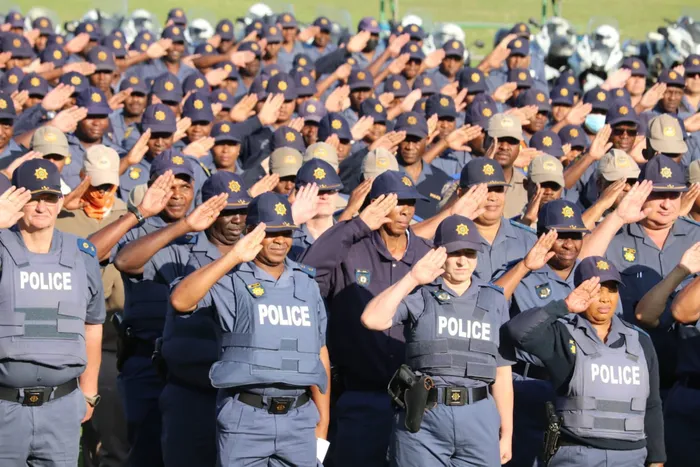The role of the police in governance, democracy, and safety
Strengthening SA's detective services

Given the high rates and complexity of crime in South Africa, the establishment of a robust, well-equipped, and professional detective service within SAPS is not just advisable - it is imperative, says the weriter.
Image: File
THE effectiveness of a police service is a cornerstone of any stable and democratic society. Beyond enforcing laws, the police embody the social contract between the state and its citizens, where law and order are maintained in exchange for the protection of individual rights and freedoms.
In a nation like South Africa, which has undergone a profound political transformation from apartheid to a constitutional democracy, the South African Police Service (SAPS) is more than just a law enforcement body - it is a guardian of the democratic ideals enshrined in the Constitution. The Constitution of the Republic of South Africa, particularly Chapter 2, known as the Bill of Rights, provides the foundational framework for these ideals, and at the heart of this legal framework is the right of every person to live in a safe and secure environment.
This constitutional right to security is not merely aspirational; it imposes an active and binding obligation on state institutions, especially SAPS, to protect the public and uphold justice. It is within this broader mandate that SAPS operates - tasked not only with fighting crime, but with promoting social stability, protecting human dignity, and ensuring equality before the law. The SAPS, therefore, becomes a vital instrument through which the promises of the Constitution are realised, and through which public trust in the state is either reinforced or eroded.
The constitutional mandate of SAPS
Under the democratic Constitution of South Africa, SAPS plays a critical role in advancing the objectives of a just and equitable society. Section 205 of the Constitution states clearly that the objects of the police service are to prevent, combat and investigate crime; to maintain public order; to protect and secure the inhabitants of the Republic and their property; and to uphold and enforce the law. These constitutional functions go beyond the traditional view of policing as mere crime fighting; they reflect a deep commitment to human rights, justice, and democratic accountability.
Importantly, these functions must be performed in a manner that respects the rights of individuals and communities, promotes transparency, and is responsive to the needs of the population. For this reason, SAPS must operate not only as a reactive force but also as a proactive one - engaging with communities, building partnerships, and fostering a culture of respect and service. In this way, the police service becomes a visible and effective agent of constitutional democracy.
The significance of safety and security
The right to safety and security is integral to the enjoyment of all other rights. Without personal safety, individuals cannot fully exercise their freedoms, pursue opportunities, or participate meaningfully in social and economic life. Insecurity undermines not only individual well-being but also societal cohesion and national development. It fosters fear, reduces investment, destabilises communities, and weakens the rule of law.
In South Africa, where crime rates remain among the highest in the world, the importance of a well-functioning and credible police service cannot be overstated. Citizens in many parts of the country live under the constant threat of violent crime, including murder, assault, sexual violence, and armed robbery. Property crimes, fraud, and organised criminal activities such as human trafficking and illicit trade also continue to pose significant challenges. These realities underscore the critical need for a professional and capable police service that can investigate and resolve crimes efficiently and justly.
The need for a strong detective service
One of the most pressing areas within SAPS that requires urgent reform and strengthening is the detective and investigative service. The ability to investigate crimes effectively is central to the delivery of justice. Without thorough investigations, crimes go unsolved, perpetrators remain at large, victims are denied justice, and public trust in the criminal justice system is diminished. Detectives are the bridge between the occurrence of a crime and the eventual prosecution of the offender. Their work is critical to ensuring accountability and deterring further criminal behaviour.
Given the scale and complexity of crime in South Africa, the current detective services are often overstretched and under-resourced. Many cases remain unresolved due to capacity issues, lack of training, insufficient tools, or procedural errors. As a result, conviction rates suffer, and communities lose faith in law enforcement. The establishment and expansion of a well-resourced, technically skilled, and strategically managed detective division within SAPS would significantly improve the overall effectiveness of the police service.
This detective service should not only be well-staffed but also be equipped with state-of-the-art investigative technologies, including digital forensics, surveillance tools, data analysis software, and access to national and international crime databases. Detectives should receive continuous professional development and training in areas such as crime scene management, evidence handling, interviewing techniques, and investigative ethics. Specialisation should be encouraged to deal with particular forms of crime, such as cybercrime, financial fraud, narcotics, and human trafficking.
Enhancing investigative capacity: a multi-level approach
Strengthening detective services must be approached holistically, involving not only increased financial investment but also institutional reform and strategic planning. First, recruitment and selection processes should be refined to ensure that individuals with the appropriate qualifications, aptitude, and integrity are chosen for detective roles. Transparency in selection, accompanied by merit-based promotion systems, will help cultivate a culture of professionalism and accountability.
Second, infrastructure and logistical support must be improved. Many detective units currently operate in substandard conditions, lacking vehicles, office equipment, or even basic supplies. These limitations hinder investigations and demoralise personnel. Equipping detective branches with the necessary tools is a prerequisite for effective performance.
Third, cooperation between SAPS and other parts of the criminal justice system - such as the National Prosecuting Authority, judiciary, and forensic laboratories - must be strengthened. Inter-agency collaboration ensures that investigations are conducted efficiently and that evidence is processed and presented effectively in court. Furthermore, stronger ties with community-based structures can provide detectives with critical local knowledge, support, and trust.
Fourth, the ethical conduct of detectives must be a non-negotiable standard. Corruption, abuse of power, and misconduct within investigative units not only compromise the legitimacy of the police but also allow criminal networks to flourish. Robust oversight mechanisms, internal accountability structures, and public reporting tools can help monitor performance and uphold ethical standards.
Social and psychological dimensions
While crime is often viewed as a legal issue, it also has profound social and psychological dimensions. High crime rates create environments of fear and trauma, especially in communities that are already vulnerable due to poverty, inequality, and historical marginalisation. Effective detective work - by bringing perpetrators to justice and ensuring victims are heard and supported - can contribute to healing and reconciliation in affected communities.
Moreover, visible justice plays a critical symbolic role. When people see that crimes are being properly investigated and that offenders are held accountable, they are more likely to trust the police and the justice system. This trust, in turn, encourages greater cooperation with law enforcement, improved community-police relations, and ultimately, more effective crime prevention.
Crime prevention through justice
A functional and respected detective service contributes directly to crime prevention. This may seem counterintuitive - detectives operate after crimes have been committed, while prevention focuses on reducing the occurrence of crime. However, the relationship between justice and prevention is well established. When potential criminals observe that crimes are consistently solved and punished, the perceived risk of offending increases, which acts as a powerful deterrent.
Additionally, many crimes - especially those committed by organised criminal groups - are repeat or serial in nature. Effective investigations that dismantle these networks have a multiplier effect, reducing the overall incidence of crime in a given area. Similarly, holding violent offenders accountable removes them from society and prevents future harm.
A vision for a safer South Africa
The establishment of a high-functioning detective service must be viewed not as a luxury, but as a fundamental necessity in building a safer South Africa. It is a necessary extension of the constitutional promise of safety and security. It is also a practical response to the day-to-day challenges that millions of South Africans face in their homes, streets, and workplaces.
By investing in detective services, the state would be taking a decisive step toward fulfilling its constitutional mandate. Such an investment would contribute to a justice system that is fair, efficient, and accessible. It would also signal to the public that their safety is a priority, and that the rule of law is upheld not merely in words but in practice.
Moreover, this development would serve the broader goals of democratic governance by strengthening public institutions and reinforcing the legitimacy of the state. The ability of a government to maintain order and deliver justice is a fundamental test of its authority and moral standing. A professional and respected police service, especially its investigative arm, is central to passing that test.
Conclusion
In conclusion, the South African Police Service is a key institution in the architecture of democratic governance, social order, and public safety. It operates within a constitutional framework that demands not only the enforcement of laws but also the protection of rights and the promotion of justice. The right to live in a safe and secure environment is among the most fundamental human rights and one that underpins all other freedoms.
Given the high rates and complexity of crime in South Africa, the establishment of a robust, well-equipped, and professional detective service within SAPS is not just advisable - it is imperative. A strong detective division enhances the effectiveness of the police, supports victims of crime, deters potential offenders, and restores public confidence in law enforcement. It embodies the constitutional values of accountability, transparency, and human dignity.
Ultimately, the creation and strengthening of an investigative capacity within SAPS is an investment in justice, democracy, and the future stability of South Africa. It reflects a commitment not only to enforcing the law but to building a society in which every person, regardless of background or status, can live free from fear and in full enjoyment of their constitutional rights.

Professor Nirmala Gopal
Image: File
Professor Nirmala Gopal is an academic leader: School of Applied Human Science at the University of KwaZulu-Natal.
** The views expressed do not necessarily reflect the views of IOL or Independent Media.